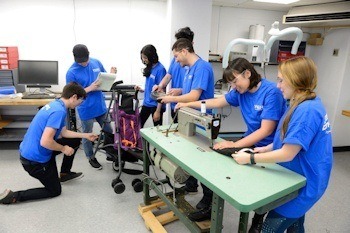Engineering Students at Johns Hopkins Customize Stroller for Syrian Child with Special Needs
Author: Johns Hopkins
Published: 2017/05/01 - Updated: 2018/04/25
Category Topic: Disability News Service - Related Publications
Page Content: Synopsis - Introduction - Main
Synopsis: Students customized stroller for local child with special needs, adding improvements to make mobility simpler and safer for him and his family.
Introduction
In an effort to enhance his quality of life, undergraduate engineering students from Johns Hopkins University have customized a stroller for a local child with special needs, adding improvements that will make mobility simpler and safer for him and his family.
Main Content
The budding engineers recently presented the new stroller to Karam Tarazi, 6, to the delight of his mother, Dana Ajilikin. She said the students' ingenuity will allow her family to enjoy more outings like the one she and her son recently enjoyed, touring through the tulips at Sherwood Gardens.
"The new stroller is just wonderful!" said Ajilikin. "It is very lightweight, so I can get it in and out of the car easily, and it is very comfortable for Karam. Much better than his heavy wheelchair, which was almost impossible for me to manage alone."

Family excursions were far more difficult before Karam's revamped vehicle was unveiled. Now, to embark on such outings, Ajilikin just has to lift her son into the new lighter stroller and off they go.
Born in Syria, Karam suffers from a rare progressive genetic disease that has damaged his nervous system, resulting in a lack of muscle control, spasticity, and other physical symptoms. The dark haired, big-eyed little boy cannot walk or talk.
More than a year ago, his parents brought him from Damascus for treatment, and the family settled in the area. At a health expo last fall, Ajilikin and her husband, Ousama Tarazi, met Angela Tyler of V-LINC, a nonprofit that matches people who have special challenges caused by disease or disability with volunteers who can design and build custom solutions for them.
"Dana told me right away about the difficulty of managing Karam in his heavy wheelchair when she had to take him out alone, and how what they needed was a lightweight stroller that was big enough and sturdy enough for their boy," said Tyler, V-LINC volunteer services manager.
Tyler reached out to Niel Leon, a Johns Hopkins senior staff engineer and V-LINC volunteer who set up the project for the student chapter of the American Society of Mechanical Engineers (ASME) at the university's Whiting School of Engineering.

"A commercially available stroller that would meet Karam's needs would cost more than $1,600. I knew the students were up to the challenge of creating what the family needed for much less," Leon said.
Working through V-LINC's "What-I-Wish" program, the students had access to $500 for the parts and supplies they needed to create the custom stroller. Those costs are paid for by donors to V-LINC.
Led by Sina Fahimi Hanzaei, a junior mechanical engineering major in the Whiting School, the eight-member student team set to work immediately, meeting with and observing Karam and interviewing both his parents and Brittany Hornby, the boy's physical therapist at the Kennedy Krieger Institute.
"Our goal was to design a stroller that would support Karam's body and frame and hold him in a secure and comfortable position, while also being lightweight enough and foldable, so his mother could manage it on her own," explained Fahimi Hanzaei.

In fact, it was the opportunity to apply his mechanical engineering skills to a project that would benefit a child with a disability and his family that spurred Fahimi Hanzaei to join the student team.
"This whole area - using engineering to make people's lives better - is something I care deeply about," said the student from Iran.
"I have family members, people very close to me, who are affected by disability. So, this project hits me close to home."
After extensive research, the students purchased an off-the-shelf, heavy-duty umbrella stroller designed to carry children up to 55 pounds, and modified it in several ways.
First, they extended the head, back, and leg rests to accommodate the child's long, slender build, and to allow for at least two more years of growth.
Second, they replaced the original small back wheels with larger lawn mower wheels from a nearby home-improvement store.
"The big challenge was that the brakes had to be on the back wheels for safety, so we took the brakes out of the old wheels and installed them in the new, larger wheels," Fahimi Hanzaei says.
"It was a complicated situation to actually mount those larger wheels on the frame with the brake system, but fortunately, we got help from people in the Whiting School's manufacturing department."
The resulting stroller weighs less than 15 pounds, supports the child's unstable torso, and, best of all, folds up easily.
Fahimi Hanzaei and Leon presented it to Karam's family on the child's sixth birthday.
In addition to team leader Fahimi Hanzaei, the undergraduates who designed and customized the stroller were Andre Ruas, Joseph Chung, Mina Banoub, Maria Coleman, Stefanie Kaye Shirley, Miranda Grenville, and Sumita Rajpurohit.
Also, as president of the Johns Hopkins ASME chapter, Cora Dimming helped organize the engineering project.
Attribution/Source(s): This quality-reviewed publication was selected for publishing by the editors of Disabled World (DW) due to its relevance to the disability community. Originally authored by Johns Hopkins and published on 2017/05/01, this content may have been edited for style, clarity, or brevity.